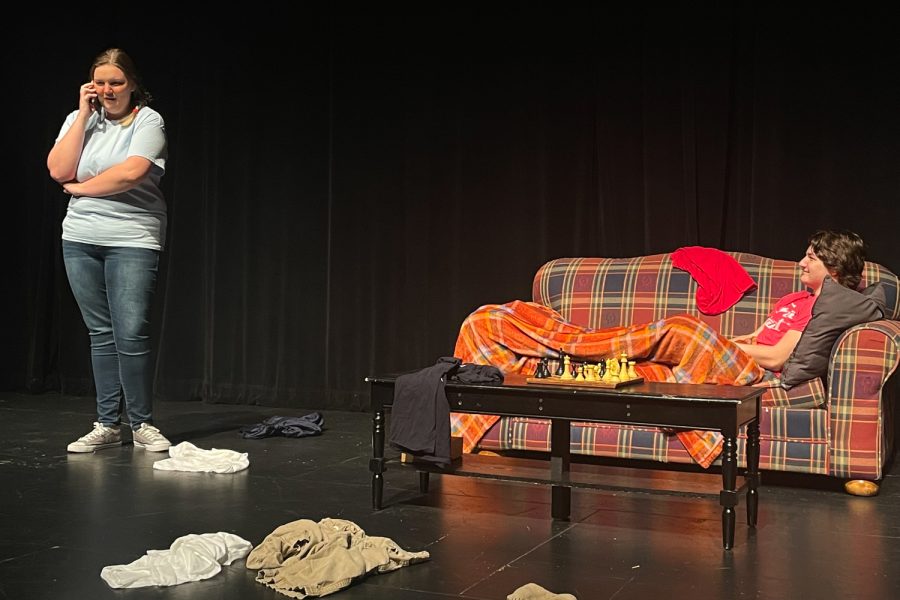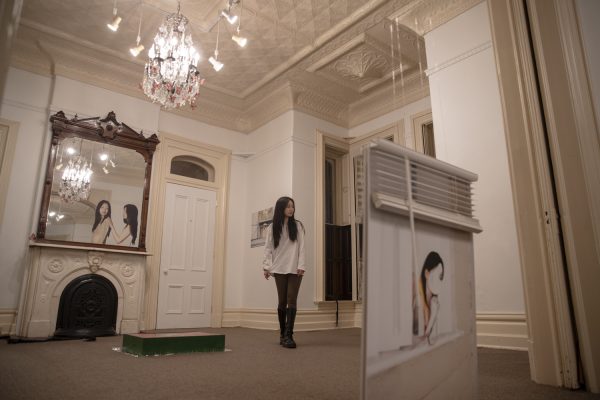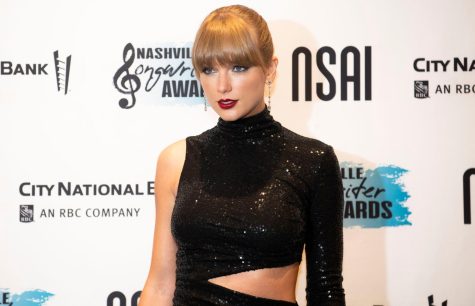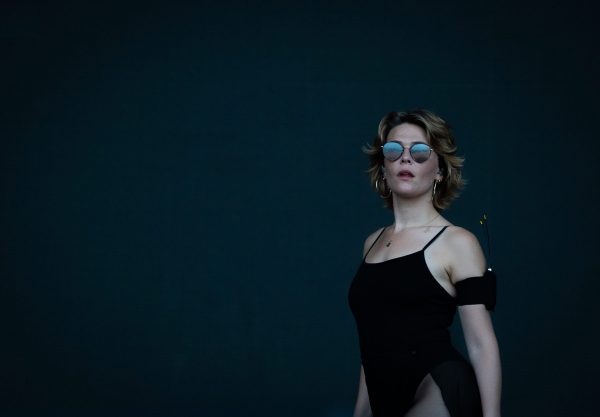Review | ‘The Lazaretto’ brought thrills and chills to UI theater
From Oct. 14-16, the Alan MacVey Theatre showed ‘The Lazaretto,’ an innovative play written and directed by UI undergraduate student Tyler Salow.
Trinity Christofferson, playing the role of the Mom, takes a call while Charlie Schmelzer, playing the role of Bobby, listens at the University of Iowa Theatre Building on Wednesday, Oct. 16, 2022. Contributed photo of Jordan “JJ” Jones of a dress rehearsal.
October 16, 2022
No one knew what to expect when they took their seats in the Alan MacVey Theatre on Friday night. There was no program provided at the door, no cast list, and no precedent set by other performances. There was only an actor sleeping on a couch on the stage, wrapped in a blanket.
From Oct. 14-16, “The Lazaretto” took center stage at the University of Iowa Theatre Building. The play opened with a woman’s voice floating in from offstage, instantly perking ears from the silent audience. The woman revealed that the sleeping boy on the couch was her son, Bobby. He had been diagnosed with an illness that was preventing him from being around other kids, and he was waiting it out at home.
Based on this exposition, one could begin to set certain expectations for the play, assuming it may be a piece about family relationships in the face of adversity. Such expectations were completely subverted when Trinity Christofferson, the actress playing Bobby’s mother, passed out during the first scene with a bloody nose.
Tyler Salow, the undergraduate director of “The Lazaretto,” and the actor playing Bobby rushed to Christofferson’s aid and moved her offstage, leaving the audience to ponder the authenticity of what had just happened. The lights came up, soft background music started playing, and still Trinity had not returned. But a doctor had stormed into the theater.
The audience watched closely as he silently scanned the seats. After a long silence, he asked if anyone had seen Trinity since he was there to help her. Like any good audience member would, Dakari Harleston directed him backstage and showed him out. However, it would soon be revealed that Harleston was not an audience member.
Neither were Emelia Wenzel, Joey Lepire, or Grayson Block, three other spectators who slowly began to engage with each other in a series of arguments and outbursts. They were all actors in the production.
The actors quickly “realized” that the auditorium doors were locked, keeping everyone in. Confused as to why no one else in the audience was concerned, they gathered together and tried to figure out what to do next.
RELATED: UI’s ‘Borderless: An All Black Affair’ showcased artists and celebrated Black culture
Eventually, they learned there had been an infectious outbreak in Iowa City causing people to behave erratically. The auditorium doors had been locked in the safety of everyone inside.
Over the course of the play, the actors tackle many obstacles, including their own rocky relationships with each other, moral dilemmas over whether or not to find a way out of the auditorium, and the prospect of being the only survivors of this infectious outbreak.
They kept the audience actively engaged the entire time, in part by using the entire space of the auditorium as their stage, even the catwalks above. The actors constantly moved around, forcing spectators to shift in their seats and keep a watchful eye. The production also featured jump scares facilitated by lighting and sound effects that kept the audience on edge.
Thanks to an incredible performance by the entire cast, particularly the protagonists, the play constantly felt like a live action science fiction film about the end of the world. It was the opportunity to be a part of horror and action and adventure, or at least to see it actively happening all around you.
Every actor brought a range of emotions to the script, as well as a unique flair. Wenzel’s amazing facial expressions convinced the audience of her spiraling panic and made them laugh along with her dripping sarcasm. Block’s body language matched his character’s chaotic energy perfectly, bringing him to life.
Lepire commanded the audience’s attention with a strong voice and even stronger stage presence. Harleston’s composure balanced the other characters’ explosive emotions, which could only be done with an incredibly convincing and realistic performance. Altogether, these actors played off each other with great chemistry.
The play concluded with a climax of sound effects and a power surge that left the auditorium in complete darkness. Block’s cries echoed on the stage as Christofferson, who had found a way into the auditorium eerily covered in blood, chased him down.
Suddenly, the sound effects stopped, the lights came up, and Salow poked his head through the auditorium door. He thanked everyone for coming but asked them to leave because Christofferson was not feeling well enough to perform.
The actors, who were back in their seats like nothing had happened, were the first people to leave. They looked around, confused, as the audience applauded them, committing to their roles until the very end.















